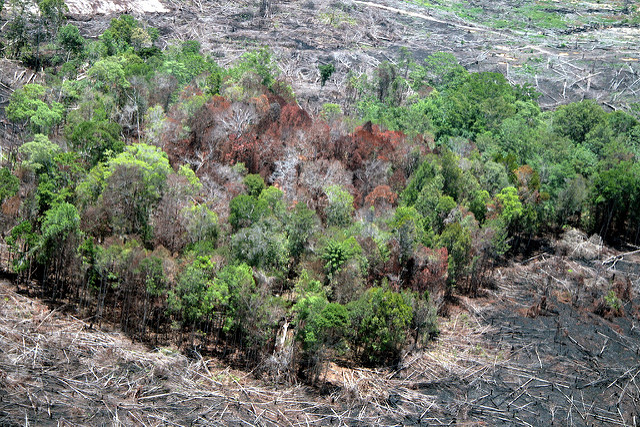http://e-info.org.tw/node/118243
韓國公司焚燒印尼雨林 3萬公頃棲地變棕櫚園
文字大小
615 1 Share1
本報2016年9月9日綜合外電報導,姜唯編譯;蔡麗伶審校
最新調查揭露,印尼巴布亞最大的棕櫚油公司Korindo,正系統性地在住著許多特有種動物的雨林中伐木和焚燒,以擴增棕櫚園的數量。當地棕櫚油業的擴張,不只驅逐野生動物,如巴布亞樹袋鼠、極樂鳥和食火雞,就連當地社群的土地也慘遭剝奪。
為擴大種植棕櫚園而砍伐雨林,不只造成空氣霾害同時也大肆剝奪了當地社群與特有種的棲息地。圖片來源:Wakx (CC BY-NC 2.0)
三年內夷平3萬公頃雨林 毀了特有種動物家園
非政府組織聯盟「Mighty」用衛星影像、無人機和地面調查發現,過去三年間,韓國棕櫚油公司Korindo,在巴布亞和北馬魯古省的租地內,夷平1萬1700公頃的原始雨林和1萬8300公頃的新生雨林。
巴布亞坐擁印尼50%的生物多樣性,棲息著許多特有種動物,包括會爬山的有袋動物樹袋鼠。然而棕櫚油業卻在此蓬勃發展。2005年和2014年間,棕櫚園數量從五座增加到21座,其中七座為Korino所有。
2013年起,租地中,共發生數百次大火。去年是高峰,熱感應衛星偵測到近500次的大火。儘管違反印尼法令,棕櫚油公司仍好用火清除殘餘森林,以為種植單一作物做準備。2015年,印尼年度焚林季節讓大部分東南亞被霧霾籠罩。根據世界銀行的估計,霧霾造成印尼160億美元的損失。
Mighty的報告指出,Korindo租地大火佔2015年全印尼森林大火的0.7%。全印尼有好幾百間棕櫚油與林業公司,如此的比例相當驚人。
沒有永續認證 韓國Korindo棕櫚油賣給IOI集團
9月前,Korindo的棕櫚油持續銷往全世界最大的棕櫚油貿易集團,包括豐益(Wilmar)、春金集團(Musim Mas)、ADM和IOI。
「考量供應商未能改善且指控嚴重,豐益自6月起已經停止向Korindo購買棕櫚油。」豐益發言人說。
在印尼,租地上清理土地並非違法,但違背了棕櫚油業零砍伐的承諾。Korindo並非永續棕櫚油圓桌會議(Roundtable on Sustainable Palm Oil)的成員,也沒有發佈任何永續政策。
IOI前供應商涉嫌毀林的指控在棕櫚油業鬧得沸沸揚揚。IOI的營業許可被永續棕櫚油圓桌會議暫停後,業界隨即面臨永續棕櫚油短缺的問題。雖然永續棕櫚油圓桌會議今年稍早已恢復IOI的營業許可,但聯合利華、雀巢和家樂氏等大客戶仍然拒絕向IOI購買棕櫚油。
【延伸閱讀】
【相關文章】
【參考資料】
- Climate Home(2016年9月1日),Korean palm oil company destroys Papua tree kangaroo habitat
Korean palm oil company destroys Papua tree kangaroo habitat1
Satellite imagery, drones and ground surveys uncover the denuding of 11,700 hectares of pristine rainforest in the past three years

Aerial photograph showing a pile of wood that has been prepared for burning in Korindo's PT PAPUA ALAM LESTARI (Source: Mighty)
The biggest palm oil company in Indonesia’s Papua province is systematically logging and burning a region of rainforest that is home to tree kangaroos, birds of paradise and cassowaries, a new investigation has revealed.
Using satellite imagery, drones and ground surveys a collaboration of NGOs calling itself Mighty uncovered the denuding of 11,700 hectares of pristine rainforest in the past three years in palm oil concessions operated by Korean company Korindo in Papua and North Maluku provinces. On top of the old-growth forest, 18,300 hectares of regrowth was stripped.
Bustar Maitar, who works in Papua for Mighty, was involved in the field expeditions that uncovered the devastation. Walking out of the living forest onto the bulldozed land ready for planting was “completely shocking and very sad”, he said.
“We see clear land. No timbers there. No green trees. No trees. No birds of paradise. There is no tree kangaroos. There is no life after they are clearing the forest,” he said.

Tree kangaroos are threatened by forest clearance (Pic: Flickr/Daniela Parra)
Papua carries 50% of Indonesia’s biodiversity. Many of its animals exist nowhere else on earth and the forests play home to the climbing marsupial tree kangaroos.
But amid all this life, palm oil is booming. Between 2005 and 2014 the number of operating plantations went from five to 21 – seven of them owned by Korindo.
This expansion is not only driving out wildlife; local communities are also having their land forcibly stripped away, according to the report.
Since 2013, hundreds of fires have been recorded in the concessions, peaking last year when nearly 500 blazes were caught by heat sensing satellites.
Palm oil companies are notorious for using fire to clear away forest debris and make land ready to plant their monocultures, despite this being against the law in Indonesia.
In 2015, the fumes from Indonesia’s annual burning season blanketed much of south east Asia in a deadly, choking smog. The World Bank estimates they cost the country US$16bn.
Fires in Korindo concessions made up 0.7% of all Indonesia’s burns that year, said Mighty’s report, an astonishing figure considering there are hundreds of palm oil and forestry companies working across the country.

PT Tunas Sawa Erma 1B concession, where 2,800 hectares of primary and secondary forest was cleared since 2015. Source: Mighty
Maitar said the debris left in concessions logged this year had been stacked and lined up, ready to be burned. The delayed dry season, which usually begins in June and brings the plantation fires, has now begun in earnest according to Greenpeace. On Wednesday the NGO reported 1,296 hotspots had appeared inside Indonesian oil, logging and mining concessions throughout August.
Until just this month, Korindo’s oil was being bought by some of the world’s biggest palm oil traders – Wilmar, Musim Mas, ADM, and IOI. They supplied it to consumers in Europe, North America, China and India, according to the report released by Mighty.
“Due to a lack of progress from the supplier, and in view of the serious allegations, Wilmar has ceased procuring from Korindo with effect from June 2016,” said a Wilmar spokeswoman.
Musim Mas has also stopped purchasing from Korindo but said it would continue a dialogue with the company. “We believe that transformation can only be achieved through positive engagement and result in real impact on the ground,” said a spokeswoman for the Singaporean company.

Deforestation in Korindo oil palm plantation, Papua (Pic: Mighty)
ADM and IOI bought their Korindo oil from Wilmar and Musim Mas. As such, Korindo has lost major business in the past season. The company did not respond to questions from Climate Home. Maitar said his organisation’s allegations had been similarly ignored by Korindo.
Clearing land in concessions is not always illegal in Indonesia. But it goes against the palm oil industry’s commitments to zero deforestation. Korindo is not a member of the Roundtable on Sustainable Palm Oil (RSPO) – the industry’s voluntary certification process – and has no published sustainability policy.
The allegations of delinquency against a former supplier of IOI are particularly jarring for the industry, which has been dealing with a shortage of sustainable palm oil since IOI had its license temporarily suspended, then reinstated by the RSPO earlier this year. Big buyers, including Unilever, Nestlé and Kellogg’s,continue to refuse to buy from the relicensed IOI – which is one of the largest suppliers in the world.
*Note: the article was amended to remove a reference to Musim Mas placing a moratorium on Korindo.









沒有留言:
張貼留言